Raleigh, North Carolina

Caroline Donovan, Alexandra Fries, and Suzi Spitzer attended the 2019 Citizen Science Association Conference last month. Caroline facilitated a roundtable discussion about the Chesapeake Monitoring Cooperative. Suzi gave a talk about the Citizen Scientist Submerged Aquatic Vegetation Monitoring Protocol. Alexandra led a workshop on best practices in science communication. There was a screening of the short film, Backyard Wilderness, which was a cool thing to do as part of the conference
Chesapeake Bay Report Card 2018 released!

AN released the 2018 Chesapeake Bay Report, giving the Chesapeake a C grade. Due to heavy rainfall in the past year we saw many indicators stay steady or decline in their score. Over the past decade we have noticed a significant improving trend in the Chesapeake Bay. This trend will continue to improve with the collective effort of the people who live here. More information about indicators and grades is available at ecoreportcard.org.
The Sudbury, Assabet, and Concord River system receives a grade of B
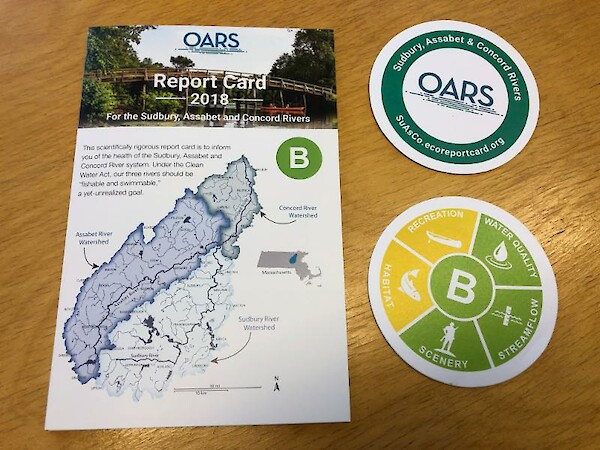
Massachusetts, USA. Congratulations to the team at OARS: For the Assabet, Sudbury, and Concord Rivers on the release of their first report card! IAN worked closely with the OARS team throughout the report card process: facilitating the initial kick-off workshops, and consulting on the grading and final report card document. To learn more about the report card scores, and dig deeper into the data, visit: https://ecoreportcard.org/report-cards/sudbury-assabet-concord-rivers/
2019 Chesapeake Bay and Watershed Report Card
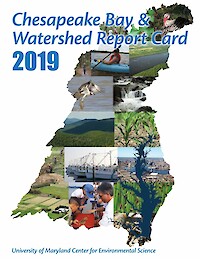
For the first time, Chesapeake Bay watershed health was scored as part of the report card and scored a B-. The Chesapeake Bay health score dropped from a grade of C to a C-. In addition to ecological indicators, societal indicators were included for the first time.
Science Communication Workshop at CERF 2019
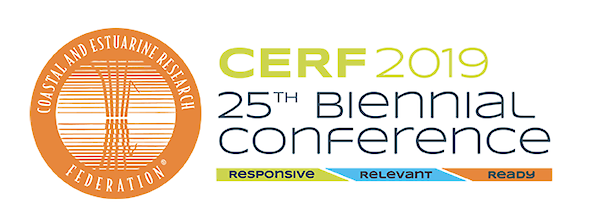
The Coastland and Estuarine Research Federation (CERF) conference in November will feature a workshop course taught by IAN's Alexandra Fries. The course title is "Analyzing, Synthesizing, and Communicating Your Data." More information can be found here.
Western Lake Erie Report Card
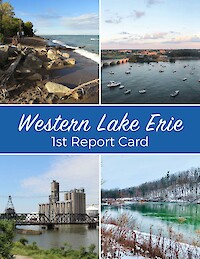
This year, we launched the first-ever report card for the western basin of Lake Erie and its associated watershed. The report is the culmination of nearly two years of work among partners and contributors from Michigan, Ohio, Indiana, and Ontario. Based on 2018 data, the lake received a C and the watershed received a C+.
Communicating the benefits of a Water Quality Trading Program

Last fall, IAN collaborated with the Maryland Department of Environment (MDE) to generate a series of communications products that promote the department's Water Quality Trading Program. This program is designed to allow Marylanders to buy and sell water quality credits across the state as a means to both reduce pollution in the Chesapeake and build capital for local businesses. IAN produced a newsletter about the trading program and a storymap for the MDE website, which will be live soon.
Creating a resilient river report card and scenario model for the Upper Rio Grande
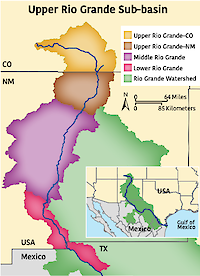
The first stakeholder workshop to develop an eco-health report card and scenario model for the Upper Rio Grande occurred in late 2020. More than 50 diverse stakeholders from government, the private sector, academic institutions, irrigation districts, and indigenous communities participated. This newsletter describes the outcomes of the workshop.
First-ever Western Lake Erie Report Card now available
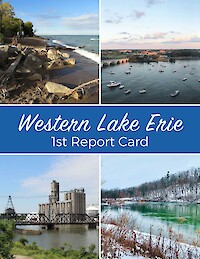
On August 14, IAN launched the first-ever report card for the western basin of Lake Erie and its associated watershed. The report is the culmination of nearly two years of work among partners and contributors from Michigan, Ohio, Indiana, and Ontario. The virtual release event was well-attended and features speeches from Toledo Mayor Wade Kapszukiewicz and U.S. Representative Debbie Dingell. You can view the full report card here.
Chesapeake Bay Watershed Report Card released!
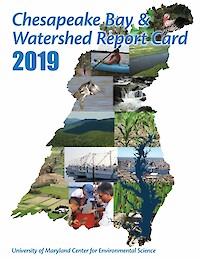
On May 19th, Chesapeake Bay Watershed Report Card was released during a virtual event. Speakers included Dr. Peter Goodwin, Dr. Bill Dennison, Secretary Ben Grumbles, Secretary Matthew J. Strickler, Ann Swanson, Kate Fritz, Jake Reilly, and Secretary Jeannie Haddaway-Riccio. For the first time, Chesapeake Bay watershed health was scored as part of the report card and scored a B- grade. The Chesapeake Bay health score decreased in 2019, dropping from a grade of C to a C-. In addition to ecological indicators, societal indicators were included for the first time. There were over 90 people watching the live webinar event, and 95 million people were reached through traditional and social media. You can view the full report card document here or visit the report card website here.
IAN's staff continues to grow and evolve

IAN graduate student Vanessa Vargas-Nguyen was conferred with the first Ph.D. under the Environment and Society foundation of MEES during the virtual UMCES commencement ceremony. She is now a science integrator at IAN and will spearhead the upcoming COAST Card project. Science communication intern Annie Carew is joining IAN staff as a science communicator. She graduated from UMCES last year. IAN's program manager Alexandra Fries was promoted to FRA3. She was also nominated as the FRA representative to the UMCES faculty senate.
The Chesapeake Bay Report Card will include new watershed indicators
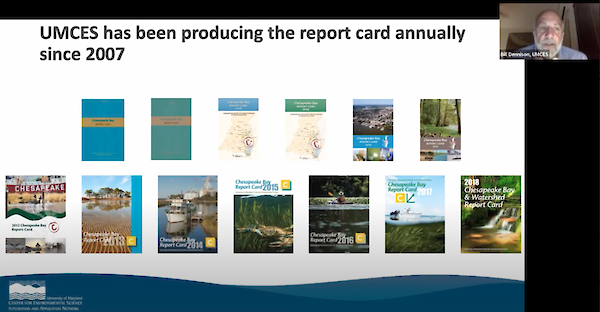
As part of the revisions to the Chesapeake Bay Report Card this year, IAN hosted a two-hour webinar for stakeholders to consider the proposed indicators that were in development. The workshop was very well-attended by stakeholders from all over the watershed. Through a lively discussion by video conference, and through the use of the chat function, stakeholders generated great feedback and recommendations on how to proceed. This year, the Chesapeake Bay Report Card will unveil additional indicators that assess the health of the watershed, for the first time in its 14-year history. The report card will be released on May 19. Stay tuned!
The first Verde River Watershed Report Card was released in Arizona
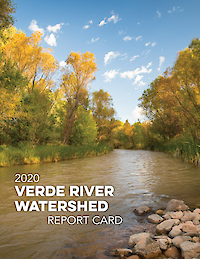
The Nature Conservancy and Friends of the Verde River released the first ever Verde River Watershed Report Card on February 18 in Camp Verde, AZ. This report card evaluated indicators that reflect three distinct values in the Verde watershed: Water, Habitat, and Communities. Overall, the Verde Watershed earned a score of 57%, a C+. This score indicates that while the watershed is in moderate condition, there is still room for improvement. In particular, some of the Water indicators scored poorly--or lacked data to be scored at all. Through their joint effort, the Nature Conservancy and Friends of the Verde River hope to raise the scores of these indicators, as well as the overall watershed score, in the future.
Revamping the Chesapeake Bay Report Card
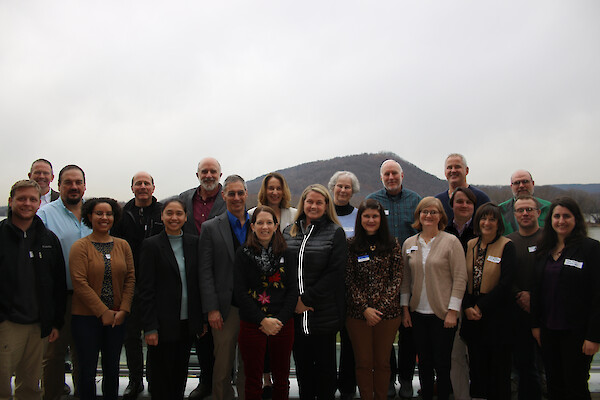
From January 7–8, IAN staff traveled to Harrisburg, PA for a workshop to expand the Chesapeake Bay Report Card. Bill, Caroline, Alex, Sky, and Vanessa facilitated and presented at the workshop. The workshop brought together stakeholders to discuss how to include watershed and socioeconomic data in future report cards. Watershed reporting regions were developed and numerous new indicators were discussed. Moving forward, there will be another workshop held in Virginia this spring to further refine the indicators and data analysis methodology.
Florida Everglades Report Card
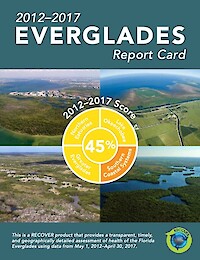
The first Florida Everglades Report Card was released in 2019, covering data from 2012–2017, in complement to the 2019 System Status Report. The Everglades received a score of 45% (C).
2018 Chesapeake Bay Report Card
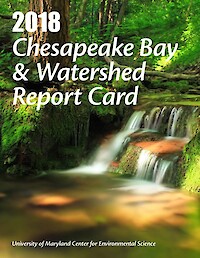
We compiled and created the annual health score for the Chesapeake Bay. This year's report card added indicators as well as scoring the Bay itself, which received a score of 45% (C) in 2018.
Check out our new website!
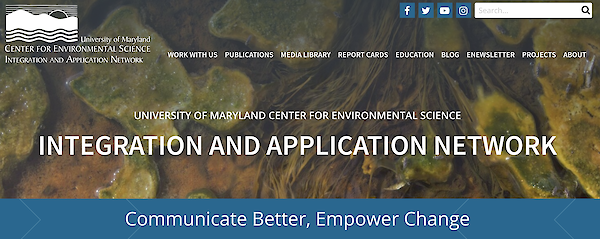
We are happy to announce the launch of our brand-new website at ian.umces.edu
The new website has functions to search our symbol and image libraries and peruse all of our publications, projects, and staff profiles. Check it out!
2020 Coastal Georgia Report Card now available
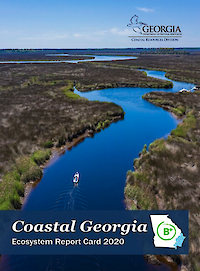
This is the seventh Coastal Georgia Ecosystem Report Card. Georgia DNR has been creating report cards since 2014, when IAN helped kick off the process. This report card updates indicators and methods. New indicators added were dissolved oxygen, spotted seatrout, and bald eagles. Overall, Coastal Georgia received a score of 77%, a B+.
Now available: 2020 Chesapeake Bay and Watershed Report Card
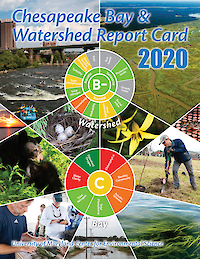
The 2020 Chesapeake Bay and Watershed Report Card was released on June 22 in person at Sandy Point State Park. The Bay itself received a moderate score (C), a slight increase from 2019. The Chesapeake Watershed was scored separately, including several new socioeconomic indicators, and received a good score (B-). The new indicators included protected lands, and the socio-economic indicators stewardship, walkability, and heat vulnerability index. The new socio-economic indicators attempt to address the question of equity in the Chesapeake Bay Watershed. Underprivileged and underserved communities are more vulnerable to adverse environmental impacts. We are committed to improving Chesapeake Bay environmental and socio-economic health. It is vital to incorporate equity and justice into environmental management.
Despite the tumult of 2020, the essential work of monitoring the Chesapeake Bay and Watershed continued. We are grateful to our partners and staff whose hard work made this report card possible. Visit ecoreportcard.org to view the full report card and learn more about the indicators and process.
We're hiring!
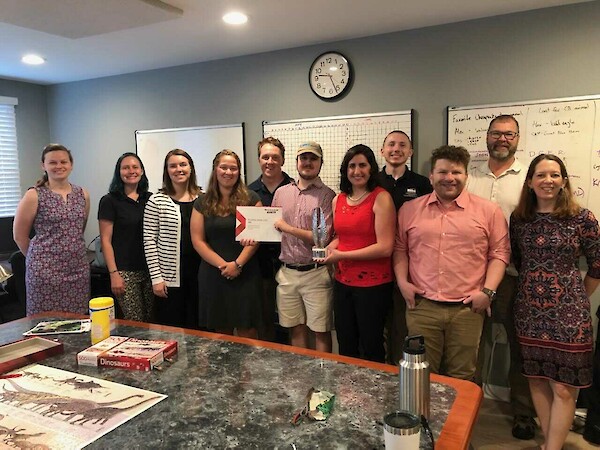
We are currently seeking applicants for our science communication internship. This internship is targeted to graduate or advanced undergraduate students with backgrounds in science and communication. A degree in biology, environmental science, or related field is required. Interns are expected to work with a variety of software packages including Adobe Creative Suite, Microsoft Office, and GIS applications. Training will be provided, but familiarity with these products is preferable.
The science communication intern will have multiple duties depending on their qualifications and interests. Tasks may include:
- editing text, photos, and videos,
- creating new vector images and conceptual diagrams
- conducting data analysis with Excel and R
- plotting spatial data and preparing maps
- creating print-ready InDesign documents
- working with media outlets such as Facebook, Twitter, YouTube, Vimeo, etc.
- creating high quality videos with After Effects and Adobe Premiere Pro
This is a contractual, hourly appointment. The chosen candidate will receive a competitive hourly wage and subsidized healthcare benefits may be available depending on number of hours worked. Additionally, interns will gain valuable skills in science communication, including desktop publishing, spatial analysis, environmental assessment, and effective communication. The team provides a dynamic, fun, and exciting atmosphere, as well as a chance to work on some of the most pressing local, national, and global environmental problems.
This position will be located in Cambridge, Maryland or Annapolis, Maryland, based on the needs of the team. Send applications to afries@umces.edu by July 9th, 2021.
IAN Report Card published
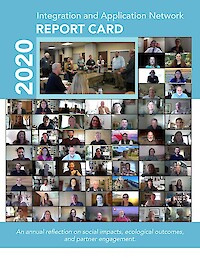
In the annual IAN Report Card, IAN staff reflect on accomplishments from 2020. The self-assessment is based on indicators in three categories: social impacts, ecological outcomes, and partner engagement. Overall, IAN received an overall grade of C (78%) which is a decrease from the 2019 score of B (84%).
Maryland Coastal Bays Report Card published
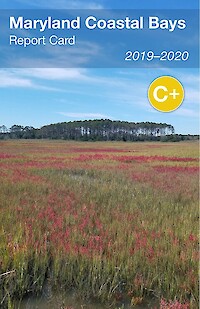
The MD Coastal Bays Report Card was released in Ocean City, MD on October 13, 2021. The aim of this report card is to provide a transparent, timely, and geographically detailed assessment of 2019–2020 Coastal Bays health. Coastal Bays health is defined as the progress of four water quality indicators (total nitrogen, total phosphorus, chlorophyll a, dissolved oxygen) and two biotic indicators (seagrass, hard clams) toward scientifically derived ecological thresholds or goals. The six indicators are combined into one overarching Coastal Bays Health Index, which is presented as the report card score. The overall score for the Coastal Bays was a C+ for the 2019-2020 reporting cycle. This was a decrease from the last full year of data in 2017.
2020 Chesapeake Bay Report Card
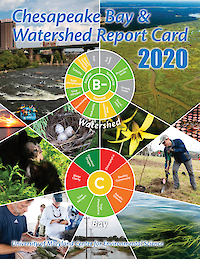
The Cheapeake Bay itself received a moderate score (C), a slight increase from 2019. The Chesapeake Watershed was scored separately, including several new socioeconomic indicators, and received a good score (B-). The new socio-economic indicators attempt to address the question of equity in the Chesapeake Bay Watershed. As part of this effort, a MEES course started work on developing a Chesapeake Environmental Justice Index framework. Environmental justice requires providing fair treatment and meaningful involvement of all people, regardless of race, color, national origin, or income, with respect to the environment.
Next week: the Upper Rio Grande Report Card!
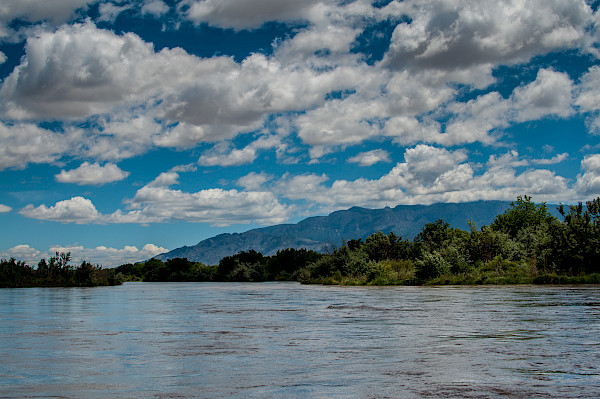
On November 17, IAN and its partners will release the first iteration of an ecosystem health report card for the Upper Rio Grande. The report card publication will be the culmination of over two years of hard work, with dedicated teams from WWF, Audubon New Mexico, University of Massachusetts Amherst, and IAN collaborating with stakeholders to gather relevant socio-environmental data relevant to this historic watershed. The report card itself provides a present-day snapshot of Rio Grande from its headwaters in Colorado to just south of El Paso, Texas. It is our hope that this report card is the first of a series of publications that will eventually cover the entire length of the Rio Grande.
Upper Rio Grande Report Card released
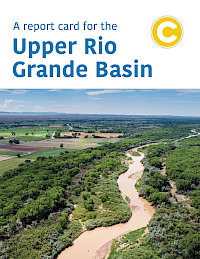
The Upper Rio Grande Report Card was released at the Randall Davey Audubon Center & Sanctuary in Santa Fe, New Mexico. Alexandra Fries, Katie May Laumann, and Nathan Miller attended and presented at the release event along with partners from Audubon Southwest, University of Massachusetts Amherst, and World Wildlife Fund. The Rio Grande scored 54%, a C. The report card evaluated 28 indicators of health in four categories: Water Quality & Quantity, Management & Governance, Society & Culture, and Landscapes & Ecology. The overall health of the basin is in moderate condition and there is not enough water to sustain the needs of all users while also maintaining a healthy river ecosystem. To view the report card and for more information please visit: www.riograndereportcard.org.
Brazilian Delegation Visits Maryland after 10 years

From March 20-21 2023, a delegation from the State of Rio de Janeiro in Brazil visited Maryland to begin the process of renewing the Memorandum of Understanding between the two states. The last visit was in 2013. Key participants from Rio were Thiago Pampolha Gonçalves, the Vice-Governor of the State of Rio de Janeiro and the Secretary of Secretariat of Environment and Sustainability; José Ricardo Ferreira de Brito, the Executive Undersecretary; Ana Larronda Asti, the Undersecretary of Water Resources, Sustainability and Waste; Bruno de Queiroz Costa, the Head of International Relations, and Márcio Barroso Santa Rosa, the Blue Economy and Bay Coordinator. Alexandra Fries, Katie May Laumann, and Bill Dennison assisted Dave Nemazie in organizing the visit and preparing presentations. The full day of presentations was March 21st, hosted at Maryland Environmental Service. We hope this visit will lead to more collaboration between the State of Rio and the State of Maryland and the continuation of the Guanabara Bay Report Card.
Sustainability Research and Innovation Congress in Panama
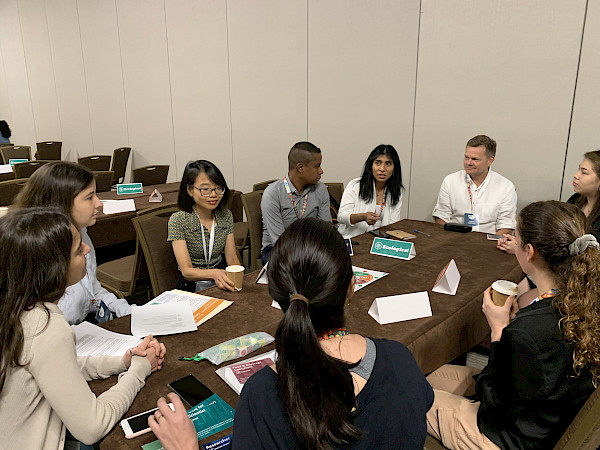
In the last week of June 2023, Alexandra Fries, Vanessa Vargas-Nguyen, and Bill Dennison attended the 2023 Sustainability Research and Innovation Congress in Panama City, Panama. They presented on several UMCES projects including the Belmont Forum-funded Pacific Ocean Pathways in Support of Sustainable Development (PacPathways) and Coastal Ocean Assessment for Sustainability and Transformation (COAST Card) projects. IAN supported Xin Zhang and Kevin Jackson from Appalachian Lab in playing the Sustainable Agriculture Matrix (SAM) version of the report card game, Get the Grade. IAN also hosted an additional Get the Grade session and a Science Communication Workshop. The Congress was a huge success and it was great to be in-person making connections with old partners and new collaborators.
Exploring sustainable solutions at the 2023 Chesapeake Watershed Forum

In November, Alexandra Fries attended the 2023 Chesapeake Watershed Forum in Shepherdstown, West Virginia. The theme of the forum was private investment in sustainable partnerships to achieve clean water goals, which led to some great sessions and interesting discussions. There was also much higher diversity in the speakers and participants attending than in previous years. IAN conducted a Data Interpretation Workshop and assisted in the Chesapeake Monitoring Cooperative session.